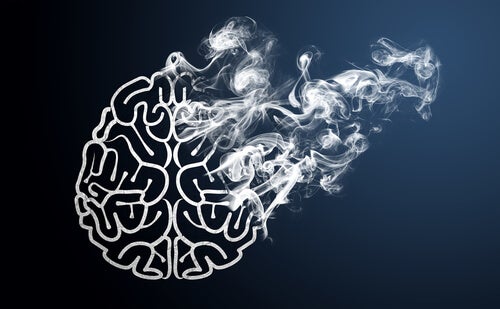What Lies Behind Laziness and What Your Brain Knows


Written and verified by the psychologist Valeria Sabater
What lies behind laziness isn’t really laziness or irresponsibility. Actually, laziness is a mask and fear hides behind it. What’s more, low self-esteem, insecurity, dissatisfaction, or even lack of emotional support are factors that play a role.
Many aspects hide behind laziness. It’s often a multiform entity, a complex labyrinth of sensations, emotions, and conflicting thoughts that you don’t always know how to unravel. However, this lack of motivation that consumes desire and energy is something that the brain understands well. This is the cause of physical immobility.
Some say that laziness is like being trapped in the present. It makes it impossible to fulfill all the obligations listed in your agenda. In turn, the very feeling of fatigue and deep discouragement also frustrates you. This anger ends up plunging you into a situation as uncomfortable as it is bothersome.
However, this dimension has its meaning and explanation. So much so that it shouldn’t destroy you or damage your self-esteem. It’s important to avoid labeling a child or teen “lazy” without first understanding what lies behind it, as fear, indecision, sadness, and even a sense of worthlessness can be the cause.

What lies behind laziness: the future that anguishes
In many cases, what lurks behind laziness is a residual dimension of our most remote ancestors. This is one of the explanations that the field of anthropology offers. Those ancestors had a basic need in their daily lives: to conserve energy.
Resources were very scarce. In fact, hunger was a daily enemy, as well as predators and adverse weather, where the sun could be extreme and the nights very cold. Our ancestors were nomadic and had to try to save physical resources, so the efforts they made were minimal and necessary. Because of this, their energy was limited to covering very basic needs in the short term.
Kalman Glantz, a psychotherapist at the University of Cambridge and co-author of Exiles from Eden: Psychotherapy from an Evolutionary Perspective, points out that the dimension of laziness arose in human beings when we began to be aware of the future. This need to plan suddenly generated psychological overexertion and an emotional cost.
Humans are now forced to expend more energy than expected. Moreover, realities such as “self-demand” appeared, such as pressure from a group to do something and, consequently, the fear of whether or not you’ll be enough. Laziness is therefore not mere laziness or idleness. It’s a combination of many dimensions. In addition, in many cases, the anguish towards the future also plays a role.

Brain apathy and overexertion
In 2015, Dr. Masud Husain, from the University of Oxford, demonstrated something interesting that allows you to better understand what lies behind laziness. Through an MRI study, he was able to see what differentiated the most active person from the one who becomes trapped by such frustrating laziness.
First of all, it was striking to see that it takes a lot of energy to plan and implement a purpose. What the brain does is release a lot of dopamine and then activate the motor cortex to facilitate movement, activity, and performance. Secondly, most people who experience laziness are actually riddled with apathy.
Dopamine levels are usually low. Likewise, the activation of the cerebral cortex isn’t very intense, because an “apathetic” brain feels incapable of carrying out this overexertion.
What’s behind the apathy that accompanies laziness?
Behind laziness is a dimension that the brain very often processes as apathy. What allows you to become trapped by this substance that dulls everything and makes it suffocating? From a psychological standpoint, it’s important to highlight the following dimensions:
- Low sense of self-efficacy.
- Lack of emotional support.
- No real interest in the task we have to perform.
- Feeling that what we have to do isn’t worthwhile.
- Fear of not doing as well as others expect.
- Discouragement, feeling of uselessness, and low self-esteem.

In short, the psychological and emotional implications of laziness make this dimension a reality that you need to consider. Therefore, it’s of little use to get angry with yourself for your low motivation. You must be able to delve deeper to understand why you feel this way.
Christianity considers laziness a cardinal sin. Although it’s always been frowned upon, it’s time to see that it’s just a mask. Behind it lies fear, indecision, low self-esteem, and dissatisfaction.
What lies behind laziness isn’t really laziness or irresponsibility. Actually, laziness is a mask and fear hides behind it. What’s more, low self-esteem, insecurity, dissatisfaction, or even lack of emotional support are factors that play a role.
Many aspects hide behind laziness. It’s often a multiform entity, a complex labyrinth of sensations, emotions, and conflicting thoughts that you don’t always know how to unravel. However, this lack of motivation that consumes desire and energy is something that the brain understands well. This is the cause of physical immobility.
Some say that laziness is like being trapped in the present. It makes it impossible to fulfill all the obligations listed in your agenda. In turn, the very feeling of fatigue and deep discouragement also frustrates you. This anger ends up plunging you into a situation as uncomfortable as it is bothersome.
However, this dimension has its meaning and explanation. So much so that it shouldn’t destroy you or damage your self-esteem. It’s important to avoid labeling a child or teen “lazy” without first understanding what lies behind it, as fear, indecision, sadness, and even a sense of worthlessness can be the cause.

What lies behind laziness: the future that anguishes
In many cases, what lurks behind laziness is a residual dimension of our most remote ancestors. This is one of the explanations that the field of anthropology offers. Those ancestors had a basic need in their daily lives: to conserve energy.
Resources were very scarce. In fact, hunger was a daily enemy, as well as predators and adverse weather, where the sun could be extreme and the nights very cold. Our ancestors were nomadic and had to try to save physical resources, so the efforts they made were minimal and necessary. Because of this, their energy was limited to covering very basic needs in the short term.
Kalman Glantz, a psychotherapist at the University of Cambridge and co-author of Exiles from Eden: Psychotherapy from an Evolutionary Perspective, points out that the dimension of laziness arose in human beings when we began to be aware of the future. This need to plan suddenly generated psychological overexertion and an emotional cost.
Humans are now forced to expend more energy than expected. Moreover, realities such as “self-demand” appeared, such as pressure from a group to do something and, consequently, the fear of whether or not you’ll be enough. Laziness is therefore not mere laziness or idleness. It’s a combination of many dimensions. In addition, in many cases, the anguish towards the future also plays a role.

Brain apathy and overexertion
In 2015, Dr. Masud Husain, from the University of Oxford, demonstrated something interesting that allows you to better understand what lies behind laziness. Through an MRI study, he was able to see what differentiated the most active person from the one who becomes trapped by such frustrating laziness.
First of all, it was striking to see that it takes a lot of energy to plan and implement a purpose. What the brain does is release a lot of dopamine and then activate the motor cortex to facilitate movement, activity, and performance. Secondly, most people who experience laziness are actually riddled with apathy.
Dopamine levels are usually low. Likewise, the activation of the cerebral cortex isn’t very intense, because an “apathetic” brain feels incapable of carrying out this overexertion.
What’s behind the apathy that accompanies laziness?
Behind laziness is a dimension that the brain very often processes as apathy. What allows you to become trapped by this substance that dulls everything and makes it suffocating? From a psychological standpoint, it’s important to highlight the following dimensions:
- Low sense of self-efficacy.
- Lack of emotional support.
- No real interest in the task we have to perform.
- Feeling that what we have to do isn’t worthwhile.
- Fear of not doing as well as others expect.
- Discouragement, feeling of uselessness, and low self-esteem.

In short, the psychological and emotional implications of laziness make this dimension a reality that you need to consider. Therefore, it’s of little use to get angry with yourself for your low motivation. You must be able to delve deeper to understand why you feel this way.
Christianity considers laziness a cardinal sin. Although it’s always been frowned upon, it’s time to see that it’s just a mask. Behind it lies fear, indecision, low self-esteem, and dissatisfaction.
All cited sources were thoroughly reviewed by our team to ensure their quality, reliability, currency, and validity. The bibliography of this article was considered reliable and of academic or scientific accuracy.
- Le Heron, C., Holroyd, C. B., Salamone, J., & Husain, M. (2019). Brain mechanisms underlying apathy. Journal of Neurology, Neurosurgery and Psychiatry, 90(3), 302–312. https://doi.org/10.1136/jnnp-2018-318265
This text is provided for informational purposes only and does not replace consultation with a professional. If in doubt, consult your specialist.







